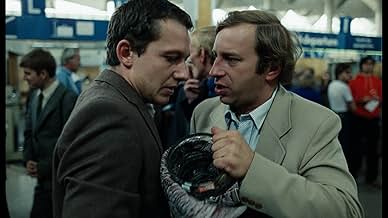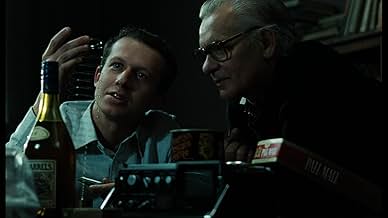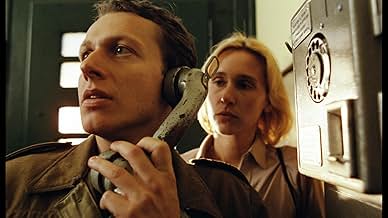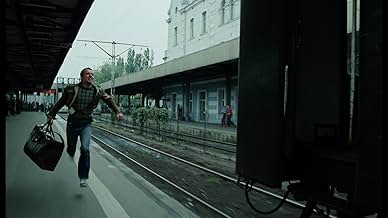Witek corre atrás de um trem. Três variações mostram como um incidente aparentemente tão banal poderia influenciar o resto da vida de Witek.Witek corre atrás de um trem. Três variações mostram como um incidente aparentemente tão banal poderia influenciar o resto da vida de Witek.Witek corre atrás de um trem. Três variações mostram como um incidente aparentemente tão banal poderia influenciar o resto da vida de Witek.
- Direção
- Roteirista
- Artistas
- Prêmios
- 2 vitórias no total
Avaliações em destaque
What did one reviewer mean by saying that we could not understand fully? i know that is probabaly true and would like to know
Yet, this is probably one of my all time favorite movies eventhough I am not a loyal Kieslowski fan. The subject of the movie is what makes the whole difference. A very interesting issue about life that I am sure is bothering a lot of people in the world. Very human plot with a lot of symbolic scenes. Do not expect to fully grasp the idea by watching it only once. And absolutely do no refrain from watching this movie at all, if you are a serious movie watcher. I give it a very enthusiastic 10.
In the Olympics, it's the difference between a gold medal and 10th place.
In the movie Blind Chance, it's the difference of a lifetime.
An example of expert craftsmanship by Krzysztof Kieslowski, Blind Chance affords us the rare opportunity to see how a blip in time, a mere split second, can profoundly affect a person's current situation, and the path their life will take from that moment forward.
While the significance of sliced seconds is shown, we get to enjoy some quality time with the communist party, the anti-communist underground, some lovely ladies sans attire, and a mob of disgruntled drug addicts. We are also treated to one or more Slinkies going down stairs alone or in pairs. Indeed, it's quite a blend of characters, motives, and ideologies. However, it is not the point of the film to take sides, make moral statements, or ponder idealistic philosophies. The point is merely to illustrate its premise.
Let there be no doubt that the premise is more than adequately served. From top to bottom, beginning to end, Blind Chance is a fantastic film, an entertaining drama that encourages thought, while not being overbearing.
Just be sure to pay close attention, because a fraction of a second can also be the difference between understanding this film and missing the point entirely.
However, "Blind Chance" is, ultimately, a political film. Although Kieslowski never really considered himself a political film-maker (compared to some of his contemporaries), "Blind Chance" is very much driven by political undercurrents and the outcome of each scenario has a decidedly political aspect. That said, the film transcends the immediate political situation in Poland as well and elevates "politics" to a much broader all-encompassing level. It is really not Polish politics that concern Kieslowski here, but the human being's capacity for taking action. Each scenario presents a possible course of action (or non-action). Kieslowski doesn't seem to endorse one course over the other, but makes a much broader statement about the need to take action, to believe in something, and to fight for something. What one is fighting for, what one believes in, ultimately isn't as important as the fight itself.
A brilliant and highly thought-provoking film. In my opinion, one of Kieslowski's most accomplished and densely-packed works. I hope that anyone who didn't appreciate "Blind Chance" will give it another chance (I've watched it at least ten times). It is not the most accessible film, but the pay-off is worth the effort.
This film is outstanding and is a must-see for anyone interested in films by Kieslowski and films of this era. It is also a great film for non-film buffs who are interested in the experience of Eastern European Communism.
This movie formats the ethical problems of living under/in Communism better than any professor or history book. You don't have to have an intricate knowledge of communism, ethics, or of post-WWII Polish history to enjoy the film. But you have to follow each scenario closely. You can't doze off or leave the theater. (I would think that the 3-in-1 format alone would be enjoyable for the average viewer--who should be able to clearly delineate the basic dilemmas in each setting.)
Those who did not live in Poland or Central and Eastern Europe can probably not fully relate to the multiple ethical obstacles daily life presented and the existential nature of it all. However, we all have choices to make in our daily lives. Although in a totally different setting, we all must make a choice to join, resist, or withdraw in various stages of our lives.
I would strongly encourage anyone to view this film. I would also encourage the previous reviewer, and any viewer of the film, to watch it more than once.
Você sabia?
- CuriosidadesAlthough the movie was made in 1981, it had its premiere in 1987. The delay was because of state-imposed censorship due to the film's political content.
- Citações
1. Werner: I intend to give you my current thoughts on an idea I've been committed to for 40 years. Every generation yearns for light. It needs reassurance and faith that the world can be better and a fairer place. This yearning which is older than Marx and younger than Marx, is like a drug. Early in life it brings joy, because the light seems so near and within reach. At life's end it brings bitterness, because the light has grown once again. In these 40 years I've lived through many things and the light seems further away than ever before, and thus I shouldn't encourage you, but you can be sure of one thing: without bitterness and this hope, life would be pitiful indeed.
- Versões alternativasThe film was scheduled for release in 1981, but was suppressed by the Polish government due to its criticism of Communist regime. The film was eventually released in 1987 with some of the politically sensitive material cut (these cuts totalling roughly 9 minutes). The film has since been released in a uncut form, however one of the scenes involving Witek being beaten by the train guard remains lost.
- ConexõesFeatured in Arena: The Ten Commandments of Krzysztof Kieslowski (1990)
Principais escolhas
- How long is Blind Chance?Fornecido pela Alexa
Detalhes
Contribua para esta página


































